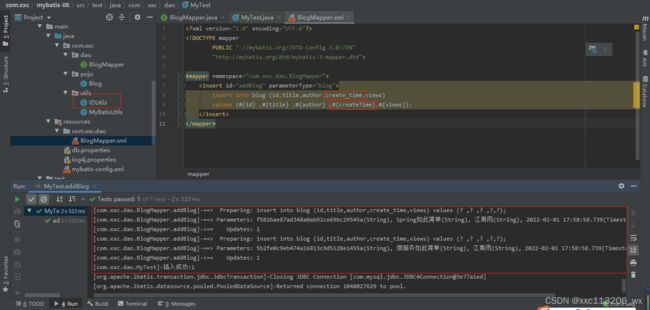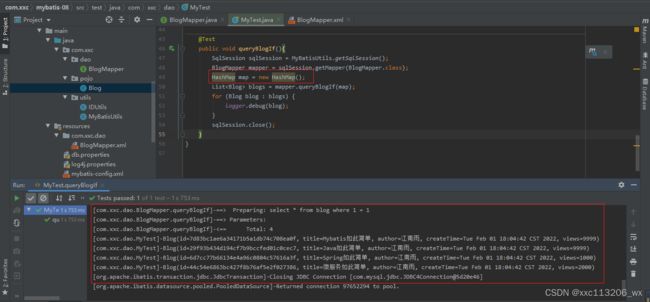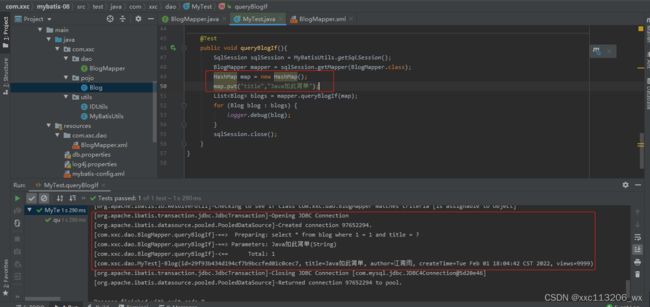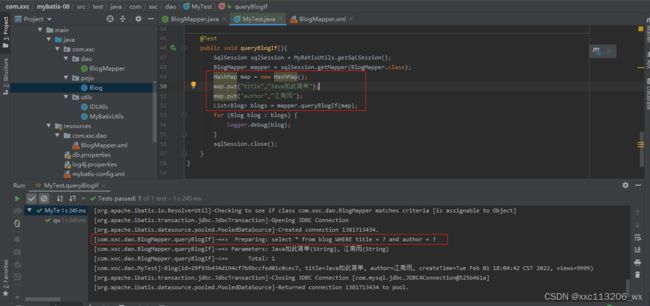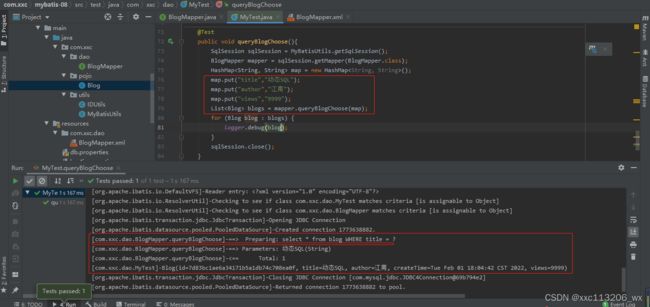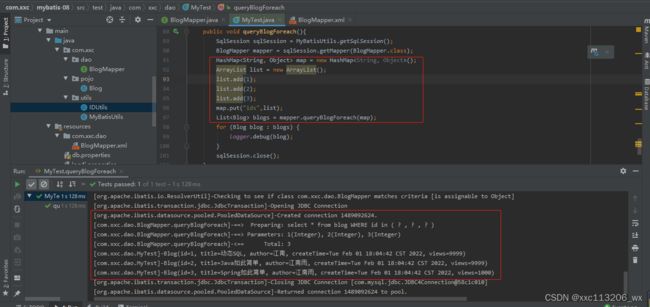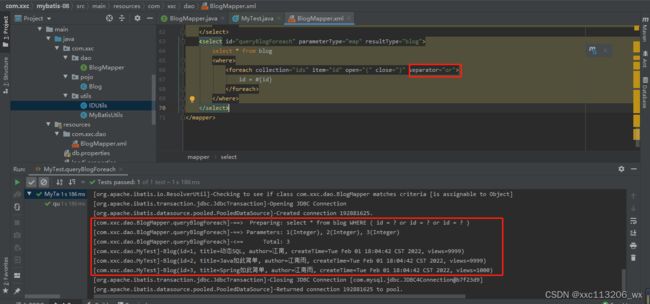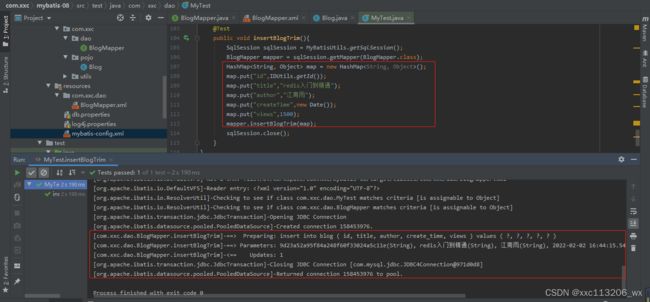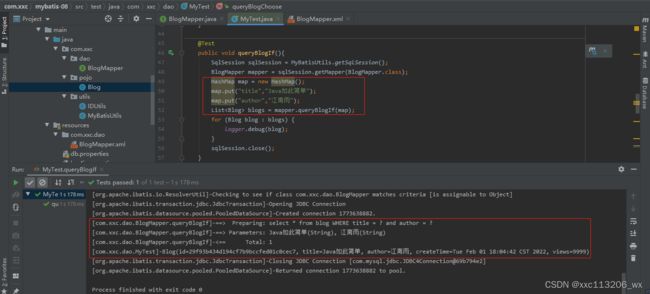mybatis学习笔记(九)。动态SQL,if,where,set,choose(when、otherwise),Foreach,SQL片段讲解。
文章目录
- 动态SQL
- 1. 数据库设计
- 2. 创建Mybatis基础工程
- 3. 动态SQL之if
- 4. 动态SQL常用标签
-
- 4.1 where
- 4.2 set
- 4.3 choose(when、otherwise)
- 4.4 Foreach
- 4.5 trim
- 5. SQL片段
- 6. 小结
动态SQL
官方文档:
https://mybatis.net.cn/dynamic-sql.html
什么是动态SQL:动态SQL指的是根据不同的查询条件 , 生成不同的Sql语句。
我们之前写的 SQL 语句都比较简单,如果有比较复杂的业务,我们需要写复杂的 SQL 语句,往往需要拼接,而拼接 SQL ,稍微不注意,由于引号,空格等缺失可能都会导致错误。
那么怎么去解决这个问题呢?这就要使用 mybatis 动态SQL,通过 if, choose, when, otherwise,trim, where, set, foreach等标签,可组合成非常灵活的SQL语句,从而在提高 SQL 语句的准确性的同时,也大大提高了开发人员的效率。
1. 数据库设计
新建一个数据库表:blog
字段:id,title,author,create_time,views
CREATE TABLE `blog` (
`id` varchar(50) NOT NULL COMMENT '博客id',
`title` varchar(100) NOT NULL COMMENT '博客标题',
`author` varchar(30) NOT NULL COMMENT '博客作者',
`create_time` datetime NOT NULL COMMENT '创建时间',
`views` int(30) NOT NULL COMMENT '浏览量'
) ENGINE=InnoDB DEFAULT CHARSET=utf8
2. 创建Mybatis基础工程
创建实体类
Blog.java
@Data
@AllArgsConstructor
@NoArgsConstructor
public class Blog {
private String id;
private String title;
private String author;
private Date createTime; // 和数据库字段不一致,可以开启驼峰命名转换
private int views;
}
在核心配置文件中开启驼峰命名转换,使用导包的方式扫描
<settings>
<setting name="mapUnderscoreToCamelCase" value="true"/>
settings>
<mappers>
<package name="com.xxc.dao"/>
mappers>
创建工具类
IDUtils.java
public class IDUtils {
public static String getId(){
return UUID.randomUUID().toString().replaceAll("-","");
}
}
uuid生成不唯一的字符串,作为主键使用。
编写插入数据接口
BlogMapper.java
public interface BlogMapper {
int addBlog(Blog blog);
List<Blog> queryBlogIf(Map map);
int updateBlog(Map map);
List<Blog> queryBlogChoose(Map map);
List<Blog> queryBlogForeach(Map map);
int insertBlogTrim(Map map);
}
编写xml文件
<mapper namespace="com.xxc.dao.BlogMapper">
<insert id="addBlog" parameterType="blog">
insert into blog (id,title,author,create_time,views)
values (#{id} ,#{title} ,#{author} ,#{createTime},#{views});
insert>
mapper>
编写测试方法
MyTest.java
public class MyTest {
static Logger logger = Logger.getLogger(MyTest.class);
@Test
public void addBlog(){
SqlSession sqlSession = MyBatisUtils.getSqlSession();
BlogMapper mapper = sqlSession.getMapper(BlogMapper.class);
Blog blog = new Blog();
blog.setId(IDUtils.getId());
blog.setTitle("Mybatis如此简单");
blog.setAuthor("江南雨");
blog.setCreateTime(new Date());
blog.setViews(9999);
mapper.addBlog(blog);
blog.setId(IDUtils.getId());
blog.setTitle("Java如此简单");
mapper.addBlog(blog);
blog.setId(IDUtils.getId());
blog.setTitle("Spring如此简单");
blog.setViews(1000);
mapper.addBlog(blog);
blog.setId(IDUtils.getId());
blog.setTitle("微服务如此简单");
blog.setViews(2000);
mapper.addBlog(blog);
sqlSession.close();
}
}
3. 动态SQL之if
需求:从博客表中查询数据,如果不传任何参数,查询所有,传入参数,按照参数查询。
改造我们的BlogMapper.xml
<mapper namespace="com.xxc.dao.BlogMapper">
<select id="queryBlogIf" parameterType="map" resultType="blog">
select * from blog
where 1 = 1
<if test="title != null">
and title = #{title}
if>
<if test="author != null">
and author = #{author}
if>
select>
mapper>
编写测试方法
MyTest.java
public class MyTest {
static Logger logger = Logger.getLogger(MyTest.class);
@Test
public void queryBlogIf(){
SqlSession sqlSession = MyBatisUtils.getSqlSession();
BlogMapper mapper = sqlSession.getMapper(BlogMapper.class);
HashMap map = new HashMap();
List<Blog> blogs = mapper.queryBlogIf(map);
for (Blog blog : blogs) {
logger.debug(blog);
}
sqlSession.close();
}
}
发现:当map为空时,查询了所有的数据。
发现:传入参数之后,查询出了满足要求的数据。
4. 动态SQL常用标签
4.1 where
在实际的开发中,这种写法是不规范的,不能写1=1的情况。
<select id="queryBlogIf" parameterType="map" resultType="blog">
select * from blog
where 1 = 1
<if test="title != null">
and title = #{title}
if>
<if test="author != null">
and author = #{author}
if>
select>
我们做如下改造即可
<select id="queryBlogIf" parameterType="map" resultType="blog">
select * from blog
<where>
<if test="title != null">
title = #{title}
if>
<if test="author != null">
and author = #{author}
if>
where>
select>
说明:这个“where”标签会知道如果它包含的标签中有返回值的话,它就插入一个‘where’。此外,如果标签返
回的内容是以AND 或OR 开头的,则它会剔除掉。【这是我们使用的最多的案例】
4.2 set
同理,上面的对于查询 SQL 语句包含 where 关键字,如果在进行更新操作的时候,含有 set 关键词,
BlogMapper.xml
<update id="updateBlog" parameterType="map">
update blog
<set>
<if test="title != null">
title = #{title},
if>
<if test="author != null">
author = #{author}
if>
set>
where id = #{id};
update>
注意:注意set是用的逗号隔开
测试
public class MyTest {
static Logger logger = Logger.getLogger(MyTest.class);
@Test
public void updateBlog(){
SqlSession sqlSession = MyBatisUtils.getSqlSession();
BlogMapper mapper = sqlSession.getMapper(BlogMapper.class);
HashMap<String, String> map = new HashMap<String, String>();
map.put("title","动态SQL");
map.put("author","江南");
map.put("id","7d83bc1ae6a34171b5a1db74c708ea0f");
mapper.updateBlog(map);
sqlSession.close();
}
}
说明:set 元素会动态地在行首插入 SET 关键字,并会删掉额外的逗号
4.3 choose(when、otherwise)
有时候,我们不想用到所有的查询条件,只想选择其中的一个,查询条件有一个满足即可,使用 choose
标签可以解决此类问题,类似于 Java 的 switch 语句
BlogMapper.xml
<select id="queryBlogChoose" parameterType="map" resultType="blog">
select * from blog
<where>
<choose>
<when test="title != null">
title = #{title}
when>
<when test="author != null">
and author = #{author}
when>
<otherwise>
and views = #{views}
otherwise>
choose>
where>
select>
测试
public class MyTest {
static Logger logger = Logger.getLogger(MyTest.class);
@Test
public void queryBlogChoose(){
SqlSession sqlSession = MyBatisUtils.getSqlSession();
BlogMapper mapper = sqlSession.getMapper(BlogMapper.class);
HashMap<String, String> map = new HashMap<String, String>();
map.put("title","动态SQL");
map.put("author","江南");
mapper.queryBlogChoose(map);
sqlSession.close();
}
}
说明:虽然写了好几个条件,但是由于使用了choose,他只会选择其中一个最先符合sql语句的条件进行查询。
4.4 Foreach
动态 SQL 的另一个常见使用场景是对集合进行遍历(尤其是在构建 IN 条件语句的时候)。
foreach 元素的功能非常强大,它允许你指定一个集合,声明可以在元素体内使用的集合项(item)和索引(index)变量。它也允许你指定开头与结尾的字符串以及集合项迭代之间的分隔符。这个元素也不会错误地添加多余的分隔符,看它多智能!
为了演示效果,先将数据库中前三个数据的id修改为1,2,3,4;
需求:我们需要查询 blog 表中 id 分别为1,2,3的博客信息。
方式一:
思考:需求相当于写了这个sql,select * from blog where id in(1,2,3);那我们将这个sql在xml中拼接出来即可。
BlogMapper.xml
<mapper namespace="com.xxc.dao.BlogMapper">
<select id="queryBlogForeach" parameterType="map" resultType="blog">
select * from blog
<where>
id in
<foreach collection="ids" item="id" open="(" close=")" separator=",">
#{id}
foreach>
where>
select>
mapper>
说明:collection:接收集合。item:每次遍历得到的参数。open:以什么开始。close:以什么结束。separator:分隔符。
测试
public class MyTest {
static Logger logger = Logger.getLogger(MyTest.class);
@Test
public void queryBlogForeach(){
SqlSession sqlSession = MyBatisUtils.getSqlSession();
BlogMapper mapper = sqlSession.getMapper(BlogMapper.class);
HashMap<String, Object> map = new HashMap<String, Object>();
ArrayList list = new ArrayList();
list.add(1);
list.add(2);
list.add(3);
map.put("ids",list);
List<Blog> blogs = mapper.queryBlogForeach(map);
for (Blog blog : blogs) {
logger.debug(blog);
}
sqlSession.close();
}
}
注意:这里的map中放入的是一个集合,使用list。
方式二:
思考:需求相当于写了这个sql,select * from blog where (id = 1 or id = 2 or id = 3);那我们将这个sql在xml中拼接出来即可。
BlogMapper.xml
<select id="queryBlogForeach" parameterType="map" resultType="blog">
select * from blog
<where>
<foreach collection="ids" item="id" open="(" close=")" separator="or">
id = #{id}
foreach>
where>
select>
测试
public class MyTest {
static Logger logger = Logger.getLogger(MyTest.class);
@Test
public void queryBlogForeach(){
SqlSession sqlSession = MyBatisUtils.getSqlSession();
BlogMapper mapper = sqlSession.getMapper(BlogMapper.class);
HashMap<String, Object> map = new HashMap<String, Object>();
ArrayList list = new ArrayList();
list.add(1);
list.add(2);
list.add(3);
map.put("ids",list);
List<Blog> blogs = mapper.queryBlogForeach(map);
for (Blog blog : blogs) {
logger.debug(blog);
}
sqlSession.close();
}
}
4.5 trim
需求:插入一条博客信息。
相当于这个sql语句:insert into blog (id,title,author,create_time,views) values(5,“redis入门到精通”,“江南雨”,NOW(),1500);,那我们在xml中拼接起来即可,还能判断些值为空值。
之前我们写了一个addBlog的接口用于插入数据,同样的,我们也可以使用insertBlogTrim这个接口来做。
<insert id="insertBlogTrim" parameterType="map">
insert into blog
<trim prefix="(" suffix=")" suffixOverrides=",">
<if test="id != null">id,if>
<if test="title != null">title,if>
<if test="author != null">author,if>
<if test="createTime != null">create_time,if>
<if test="views != null">viewsif>
trim>
values
<trim prefix="(" suffix=")" suffixOverrides=",">
<if test="id != null"> #{id},if>
<if test="title != null"> #{title},if>
<if test="author != null"> #{author},if>
<if test="createTime != null"> #{createTime},if>
<if test="views != null"> #{views}if>
trim>
insert>
说明:这个sql更体现了动态sql。prefix:以什么开始,suffix:以什么结束,suffixOverrides:以什么分隔。
测试:
public class MyTest {
static Logger logger = Logger.getLogger(MyTest.class);
@Test
public void insertBlogTrim(){
SqlSession sqlSession = MyBatisUtils.getSqlSession();
BlogMapper mapper = sqlSession.getMapper(BlogMapper.class);
HashMap<String, Object> map = new HashMap<String, Object>();
map.put("id",IDUtils.getId());
map.put("title","redis入门到精通");
map.put("author","江南雨");
map.put("createTime",new Date());
map.put("views",1500);
mapper.insertBlogTrim(map);
sqlSession.close();
}
}
使用了map的方式,更加灵活,在实际开发中更常用。
5. SQL片段
将多个sql中重复的部分提取出来。增强sql语句的复用性。
<mapper namespace="com.xxc.dao.BlogMapper">
<sql id="if-title-author">
<if test="title != null">
title = #{title}
</if>
<if test="author != null">
and author = #{author}
</if>
</sql>
<select id="queryBlogIf" parameterType="map" resultType="blog">
select * from blog
<where>
<include refid="if-title-author"></include>
</where>
</select>
</mapper>
sql标签和include标签。
注意:①、最好基于 单表来定义 sql 片段,提高片段的可重用性
②、在 sql 片段中不要包括 where
6. 小结
其实动态 sql 语句的编写往往就是一个拼接的问题,为了保证拼接准确,我们最好首先要写原生的 sql 语句出来,然后在通过 mybatis 动态sql 对照着改,防止出错。多在实践中使用才是熟练掌握它的技巧。
